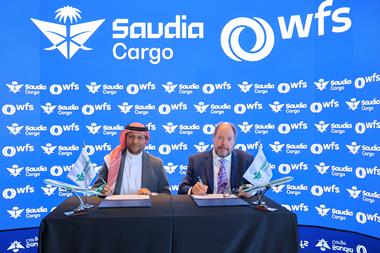European shippers would like to see new solutions developed to increase the safety of transporting lithium-ion batteries by air rather than blanket bans that stop them being flown at all.
Speaking just days after Boeing sent an advisory out to airline customers recommending carriers no longer transport lithium-ion batteries as bellyhold cargo until safer methods of packing and transport are established, the European Shippers’ Council said it believed that the batteries should be allowed to be transported but under strict rules.
ESC airfreight policy manager Joost van Doesburg said that safety was paramount and airlines needed to take a lead on deciding what was safe to transport.
He pointed out that airlines had already produced a set of safety guidelines through IATA.
“I believe that safety should always been the number issue,” he said. “There is no sensible shipper that wants to violate any rules on safety issues.
“We are all working together on improving safety further. It's positive that we have already created a secure situation and are still in the process of making it even more secure.
“I don't think it's a solution to simply say 'do not take these goods onboard' because you will see that the shippers that try to comply with every rule will not ship batteries on passenger planes but will be faced with less options - everybody knows that freighters are getting scarce.
“But there is also another aspect; when you stop certain shipment from going onboard a plane some companies, unfortunately from our perspective, will just do it anyway and these are the companies that do not want to comply with rules.
“These companies will then fly under the radar and no one will detect that they are transporting harmful batteries.”
He said that many of the incidents surrounding lithium-ion batteries involved producers of low quality products.
He added that because many batteries are moved as spare parts, it is often not the producers that actually ship them.
He suggested a risk-based assessment could be carried out to quantify which batteries are safe to transport.
“One solution could be that we could create a system where producers of certain batteries are considered reliable producers.
“If they are taking quality measures into account and prove which batteries comply to this set of rules, they can be flown and loaded onboard safely.”
Airlines, however, appear to be adopting a more stringent approach.
British Airways and Iberia parent company IAG said it had banned that transport of lithium-ion batteries as bellyhold cargo in March.
“Following a comprehensive review of our dangerous goods policy, IAG Cargo will no longer accept bookings of UN3480 lithium ion batteries as cargo on passenger aircraft as with immediate effect,” it said.
“The new policy applies to shipments of UN3480 lithium ion batteries (packed on their own). It does not affect batteries consigned as UN3481 or UN 3091 which includes batteries packed with, or contained in equipment.”
Emirates said it had banned their transport on April 1.
"Lithium ion batteries (including lithium polymer batteries) under section IA, IB and section II of Packing Instruction 965 and those qualifying for Special Provision A88 are totally restricted for carriage on Emirates services," it said.
This applies to both passenger and freighter. The Middle Eastern airline's cargo division also has a ban in place on the transport of lithium metal batteries.
Forwarders are also looking into the implications of the recommendation.
Kuehne+Nagel said:"We are currently closely monitoring the proceedings around lithium-ion batteries. For the time being we do not see notable impacts for our operations as this currently only seems to concern the non-embedded lithium batteries. But we are aware that this might change in the future."
Panalpina added: "The fact that several airlines have banned bulk shipments of lithium-ion batteries on passenger aircraft and even freighters, has reduced available cargo space for this kind of transport. However, this has had a limited impact only on our activities.
"Since we have one of the world’s most comprehensive end-to-end networks for the safe handling, storage and transport of hazardous air freight, we are in a favorable position to offer safe solutions – even if regulations should get stricter.
"We ship lithium-ion batteries both on passenger aircraft and freighters including our own charters. The choice of aircraft and carrier depends on the specific cargo requirements, route, service and rate.
"We only work with carefully selected carriers that meet our exacting performance, service-quality and safety requirements. Panalpina staff is trained according to the IATA Dangerous Goods Regulations.
"All battery shipments are checked for full compliance with the ICAO/IATA regulations including state/carrier-specific limitations.
"With strict adherence to handling, storage and loading regulations, Panalpina ensures a proper and safe hand-over of the shipments to the carriers. Panalpina would, of course, welcome and comply with any additional safety regulations."










